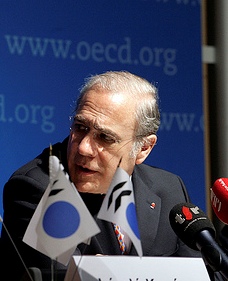Cayman listed in first group of OECD peer reviews
 (CNS): The issue of cross-border tax evasion has entered another new phase with the launch by countries participating in the Global Forum on Transparency and Exchange of Information of a peer review process covering a first group of jurisdictions, the OECD has announced. The Cayman Islands is included in this group, along with 14 other countries. The global economic watchdog said that the reviews are the first step in a three-year process approved in February by the Global Forum in response to the call by G20 leaders at their Pittsburgh Summit in September 2009 for improved tax transparency and exchange of information.
(CNS): The issue of cross-border tax evasion has entered another new phase with the launch by countries participating in the Global Forum on Transparency and Exchange of Information of a peer review process covering a first group of jurisdictions, the OECD has announced. The Cayman Islands is included in this group, along with 14 other countries. The global economic watchdog said that the reviews are the first step in a three-year process approved in February by the Global Forum in response to the call by G20 leaders at their Pittsburgh Summit in September 2009 for improved tax transparency and exchange of information.
The OECD said on Thursday that reviews are a first step in a three-year process approved in February by the Global Forum in response to the call by G20 leaders at their Pittsburgh Summit in September 2009 for improved tax transparency and exchange of information.
OECD Secretary-General Angel Gurría said he welcomed this new step forward for the international tax compliance agenda.
"The Global Forum has been quick to respond to the G20 call for a robust peer review mechanism aimed at ensuring rapid implementation of the OECD standard on information exchange,” he stated. “This is the most comprehensive peer review process in the world, and it is based on decades of experience at the OECD of conducting reviews of this kind in many other areas of policy making. I look forward to seeing the first results later this year".
The Global Forum brings together 91 countries and territories, including both OECD and non-OECD countries. At a meeting in Mexico in September 2009, participants agreed that all members as well as identified non members will undergo reviews on their implementation of the standard. These reviews will be carried out in two phases: assessment of the legislative and regulatory framework (phase 1) and assessment of the effective implementation in practice (phase 2).
The review reports will be published once they have been adopted by the Global Forum, whose next meeting will take place in Singapore at the end of September 2010.
Mike Rawstron, chair of the Global Forum, stated, “This is the most comprehensive, in-depth review on international tax co-operation ever. There has been a lot of progress over the past 18 months, but with these reviewswe are putting international tax co-operation under a magnifying glass. The peer review process will identify jurisdictions that are not implementing the standards. These will be provided with guidance on the changes required and a deadline to report back on the improvements they have made”.
The jurisdictions in the first review include Australia, Barbados, Bermuda, Botswana, Cayman Islands, India, Ireland, Jamaica, Jersey, Mauritius, Monaco, Norway, Panama, Qatar, Trinidad and Tobago.
Category: Business


Very wise.
Now if only we could actually vote for who controls this banking system – it only seems fair as they are the true leaders, decision makers, and power holders of the world.
It seems rather bassackwards to pursue all this without first examining how banks are entitled to make loans. Under the present systems of fractional reserves, which is a quaint term, but means that banks can loan up to eighteen times the amount of deposits on hand. This shell game has been allowed to continue for hundreds of years, leading to a false economy in any country which has adopted this method. Add to that, the de-regulation of the banking industry. Which, after it’s onset, allowed Commercial Banks to dabble in the Stock Market with their investments, in derivatives, shady sub-prime mortgages. Bundling these into Investment Vehicles with a somewhat dicey AAA rating and selling them on to municipalities, pension funds, etc. And to protect themselves, and spread the damage invented collateralized debt obligations. Which, un-beknownest to them, until they enquired, resulted in huge losses for the pension funds. And as well their depositers’ money. And to prevent a run on the banks and the entire house of cards to fall down bankers then asked to be bailed out with public funds. And governments agreed. Because their major campaign resources were derived from the banking industry and they had hired bankers with the same mindset to run the economy.
So they are beginning at the bottom? To correct something which started at the top? Lord help us.
I know where my money is. It’s in my sock.